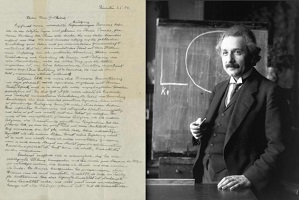Albert Einstein’s famous handwritten “God Letter”, wherein the revered physicist explicitly rejected God and religion was auctioned at Christie’s auction house in New York City on Tuesday fetching a price of nearly $ 2.9 million, beating all expected sale prices.
The famous scientist, then 74, had written the one-and-a-half-page letter to German philosopher Eric Gutkind in 1954 in response to his book called “Choose Life: The Biblical Call to Revolt.”
The letter is of invaluable significance in the ever ongoing debate between science and religion besides being of tremendous historical value to collectors and history and science buffs.
Einstein’s letter, handwritten in German, caused a sensation when it first went public at an auction sale in 2008.
“This remarkably candid, private letter was written a year before Einstein’s death and remains the most fully articulated expression of his religious and philosophical views,” a statement from Christie’s says
“The word God is for me nothing more than the expression and product of human weaknesses, the Bible a collection of honourable, but still primitive legends which are nevertheless pretty childish,” Einstein wrote.
“No interpretation, no matter how subtle, can (for me) change anything about this.”
He began his letter by praising Gutkind for sharing a common impulse of “striving for the improvement and refinement of existence”, but soon took issue with Gutkind’s religious ideals.
In the letter, Einstein turned a critical eye towards his own Jewish identity, specifically questioning the assertion that Jews were “chosen people”.
“The Jewish people to whom I gladly belong, and in whose mentality I feel profoundly anchored, still for me does not have any different kind of dignity from all other peoples,” he wrote.
“As far as my experience goes, they are in fact no better than other human groups, even if they are protected from the worst excesses by a lack of power. Otherwise I cannot perceive anything ‘chosen’ about them.”
The God letter seems to outline Einstein’s view of formal religion and the idea of a God who plays an active part in everyday life, answering individual prayers.
“He did not believe in a God who went around choosing favourite sports teams or people,” said Walter Isaacson, the author of the 2007 biography “Einstein”.
But according to experts, at other times Einstein described himself as “not an atheist” and the letter does not annul the seemingly spiritual characteristics of his thinking.












